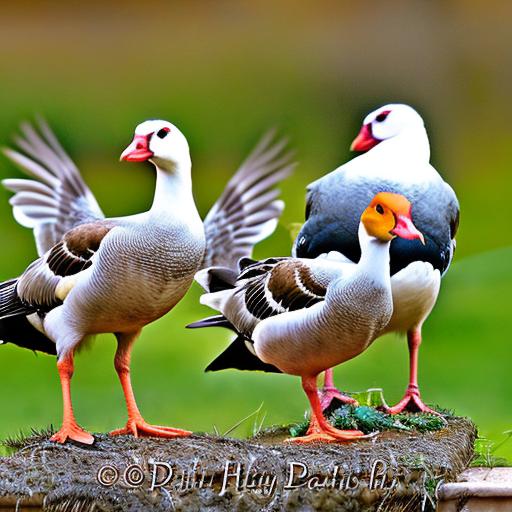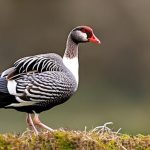Geese have been domesticated for thousands of years, with evidence of their presence dating back to ancient Egypt and Rome. They were originally kept for their meat, feathers, and down, but over time, they have also become popular as pets and for their eggs. In recent years, there has been a growing trend of keeping geese in backyard farms. This can be attributed to their many benefits, including natural pest control, fertilizer production, meat and egg production, as well as entertainment and companionship.
Key Takeaways
- Backyard geese can be a great addition to your homestead or backyard farm.
- Keeping backyard geese can provide benefits such as pest control, fertilizer, and egg production.
- Choosing the right breed of geese for your backyard depends on factors such as climate, space, and temperament.
- Housing and fencing for backyard geese should provide protection from predators and a safe, comfortable living space.
- Feeding and nutrition for backyard geese should include a balanced diet of grains, greens, and clean water.
Benefits of Keeping Backyard Geese
One of the main benefits of keeping geese in your backyard is their natural pest control abilities. Geese are excellent at foraging and can help keep your yard free from unwanted insects and weeds. They will eat grasshoppers, slugs, snails, and other pests that can damage your plants. This can help reduce the need for chemical pesticides and promote a healthier ecosystem in your backyard.
Another benefit of keeping geese is their ability to produce high-quality fertilizer. Geese have a high nitrogen content in their droppings, which makes them an excellent source of organic fertilizer. Their droppings can be used directly on your garden or composted to create nutrient-rich soil amendments. This can help improve the fertility of your soil and promote healthy plant growth.
In addition to pest control and fertilizer production, geese can also provide a source of meat and eggs for your backyard farm. Geese meat is known for its rich flavor and is often compared to beef or lamb. Their eggs are larger than chicken eggs and have a higher yolk-to-white ratio, making them ideal for baking and cooking. By raising geese in your backyard, you can have a sustainable source of meat and eggs that are free from hormones and antibiotics.
Lastly, keeping geese in your backyard can provide entertainment and companionship. Geese are social animals and can form strong bonds with their owners. They are known for their honking and hissing sounds, which can be quite amusing to watch and listen to. Geese can also be trained to follow commands and perform tricks, making them a fun and interactive addition to your backyard.
Choosing the Right Breed of Geese for Your Backyard
When it comes to choosing the right breed of geese for your backyard, there are several factors to consider. Popular breeds for backyard farming include Toulouse, Embden, and Chinese geese. Toulouse geese are known for their large size and calm temperament, making them a popular choice for meat production. Embden geese are also large in size and are known for their white feathers, making them a popular choice for ornamental purposes. Chinese geese are smaller in size and are known for their loud honking and excellent egg-laying abilities.
When choosing a breed, it is important to consider the climate and space available in your backyard. Some breeds are better suited for colder climates, while others thrive in warmer climates. It is also important to consider the noise level of the breed, as some geese can be quite loud and may not be suitable for urban or suburban areas.
Each breed of geese has its own unique characteristics. Toulouse geese are known for their calm and docile nature, while Embden geese are known for their friendly and sociable personalities. Chinese geese are known for their alertness and protective instincts. It is important to research each breed’s characteristics to ensure that it aligns with your preferences and needs.
Housing and Fencing for Backyard Geese
Geese require proper housing and fencing to ensure their safety and well-being. When it comes to housing, there are several options to choose from. The most common type of housing for geese is a simple shed or coop that provides protection from the elements. The shed should be well-ventilated and have enough space for the geese to move around comfortably. It should also have nesting boxes for egg-laying geese.
When building a goose house, it is important to use materials that are sturdy and predator-proof. Geese are vulnerable to predators such as foxes, raccoons, and dogs, so it is important to ensure that the housing is secure. The flooring of the goose house should be easy to clean and provide good drainage to prevent the buildup of moisture.
In addition to housing, geese also require fencing to keep them contained and safe. Geese are strong flyers and can easily escape if not properly fenced in. A fence with a height of at least 3 feet is recommended to prevent geese from flying over. The fence should also be buried at least 6 inches underground to prevent geese from digging under it. Electric fencing can also be used as an additional deterrent for predators.
Feeding and Nutrition for Backyard Geese
Geese have specific nutritional needs that must be met in order for them to thrive. A balanced diet is essential for their growth, egg production, and overall health. The basic nutritional needs of geese include protein, carbohydrates, fats, vitamins, and minerals.
A good quality commercial feed specifically formulated for geese is a convenient option for providing the necessary nutrients. The feed should have a protein content of around 16-18% for growing geese and 14-16% for adult geese. It is important to provide fresh water at all times, as geese require a lot of water for digestion and hydration.
In addition to commercial feed, geese can also be fed a variety of other foods. They enjoy grazing on grass, so access to fresh pasture is beneficial. They can also be fed fruits and vegetables such as lettuce, spinach, peas, and carrots. It is important to avoid feeding geese foods that are toxic to them, such as onions, garlic, and chocolate.
Basic Health Care for Backyard Geese

Like any other animal, geese can be susceptible to certain health issues. It is important to be aware of common health problems in geese and take preventive measures to ensure their well-being.
One common health issue in geese is respiratory infections. Geese can develop respiratory infections due to poor ventilation, damp bedding, or exposure to drafts. Symptoms of respiratory infections include coughing, sneezing, wheezing, and difficulty breathing. To prevent respiratory infections, it is important to provide proper ventilation in the goose house and keep the bedding clean and dry.
Another common health issue in geese is foot problems. Geese can develop foot problems such as bumblefoot, which is an infection of the foot pad. This can be caused by rough or wet surfaces. To prevent foot problems, it is important to provide a clean and dry environment for the geese to walk on. Regular inspection of their feet and prompt treatment of any issues is also important.
Signs of a healthy goose include bright eyes, clean feathers, and a good appetite. A healthy goose should have a good body condition and be active and alert. It is important to monitor your geese regularly for any signs of illness or distress and seek veterinary care if needed.
Egg Production from Backyard Geese
Egg production from backyard geese can be a rewarding experience. However, there are several factors that can affect egg production.
One factor that affects egg production is the breed of the geese. Some breeds are better egg layers than others. Chinese geese are known for their excellent egg-laying abilities and can lay up to 60-100 eggs per year. Toulouse geese are also good egg layers but may not produce as many eggs as Chinese geese. Embden geese are not known for their egg-laying abilities and may only produce a few eggs per year.
Another factor that affects egg production is the age of the geese. Geese typically start laying eggs at around 6-8 months of age. The peak egg-laying period is usually between 2-3 years of age. After that, egg production may decline.
To collect and store goose eggs, it is important to handle them with care. Goose eggs are larger and more delicate than chicken eggs, so they should be handled gently to prevent cracking. They should be stored in a cool and dry place, preferably in a refrigerator, to maintain freshness.
Goose eggs can be used in a variety of ways. They can be used in baking, cooking, or even eaten on their own. They have a rich and creamy flavor that is prized by many chefs and bakers. Goose eggs can also be used to make omelets, quiches, custards, and other delicious dishes.
Managing Geese Behavior in Your Backyard
Understanding goose behavior is important for managing geese in your backyard. Geese are social animals and have a hierarchical structure within their flock. They can be territorial and protective of their space and may exhibit aggressive behavior towards intruders.
If you have aggressive geese in your backyard, it is important to handle them with caution. Aggressive geese may hiss, bite, or chase after people or other animals. It is important to establish yourself as the dominant figure and set boundaries with the geese. This can be done by using a firm voice and body language to assert your authority.
Training geese to follow commands can also help manage their behavior. Geese can be trained to come when called, stay in a designated area, or even perform simple tricks. Training should be done using positive reinforcement techniques such as treats and praise. It is important to be patient and consistent when training geese, as they can be stubborn at times.
Training and Socializing Backyard Geese
Socializing geese from a young age is important for their overall well-being and behavior. Geese that are properly socialized are more likely to be friendly and well-behaved. They are also less likely to exhibit aggressive behavior towards humans or other animals.
To socialize geese, it is important to handle them regularly from a young age. This can be done by gently picking them up, petting them, and talking to them in a calm and soothing voice. It is also important to expose them to different environments and experiences, such as introducing them to new people or animals.
Training geese can also be a fun and rewarding experience. Geese are intelligent animals and can learn to follow commands and perform tricks. Training should be done using positive reinforcement techniques, such as treats and praise. It is important to be patient and consistent when training geese, as they can take time to learn new behaviors.
Fun activities to do with geese include taking them for walks, playing games with them, or even teaching them to swim in a kiddie pool. These activities can help strengthen the bond between you and your geese and provide mental stimulation for them.
Legal Considerations for Keeping Backyard Geese
Before keeping geese in your backyard, it is important to be aware of the local laws and regulations regarding their ownership. Some areas may have restrictions on the number of geese you can keep or may require permits or licenses for keeping geese.
It is important to research the local laws and regulations in your area before getting geese. This can usually be done by contacting your local animal control or agricultural department. They will be able to provide you with information on any permits or licenses that may be required.
Violating laws on keeping geese can result in fines or other legal consequences. It is important to comply with the regulations in your area to ensure the well-being of your geese and avoid any legal issues.
Keeping backyard geese can be a rewarding and fulfilling experience. Geese provide many benefits, including natural pest control, fertilizer production, meat and egg production, as well as entertainment and companionship. By choosing the right breed, providing proper housing and fencing, ensuring a balanced diet, and taking care of their health, you can have a successful backyard geese farm. It is important to be aware of the local laws and regulations regarding geese ownership to avoid any legal issues. With proper care and management, backyard geese farming can be a fun and sustainable endeavor.
If you’re interested in keeping backyard geese, you might also find this article on chicken coop run plans from Poultry Wizard helpful. It provides valuable insights and tips on designing a safe and functional space for your geese to roam. Check it out here.
FAQs
What are backyard geese?
Backyard geese are domesticated geese that are kept as pets or for their eggs, meat, or feathers. They are usually raised in a backyard or small farm setting.
What are the benefits of keeping backyard geese?
Keeping backyard geese can provide a source of fresh eggs, meat, and feathers. They can also help control pests and weeds in the garden, and provide fertilizer for plants. Additionally, geese can be entertaining and enjoyable pets.
What do backyard geese eat?
Backyard geese typically eat a diet of grass, grains, and vegetables. They also require access to clean water for drinking and bathing.
How do you care for backyard geese?
Caring for backyard geese involves providing them with a safe and secure shelter, access to clean water and food, and regular veterinary care. They also require regular exercise and socialization.
What are some common health issues for backyard geese?
Common health issues for backyard geese include respiratory infections, parasites, and injuries from predators or accidents. It is important to provide them with proper nutrition, clean living conditions, and regular veterinary care to prevent and treat these issues.
Are there any legal restrictions on keeping backyard geese?
There may be local or state regulations regarding the keeping of backyard geese, including zoning laws and restrictions on the number of birds allowed. It is important to research and comply with these regulations to avoid legal issues.
Meet Walter, the feathered-friend fanatic of Florida! Nestled in the sunshine state, Walter struts through life with his feathered companions, clucking his way to happiness. With a coop that’s fancier than a five-star hotel, he’s the Don Juan of the chicken world. When he’s not teaching his hens to do the cha-cha, you’ll find him in a heated debate with his prized rooster, Sir Clucks-a-Lot. Walter’s poultry passion is no yolk; he’s the sunny-side-up guy you never knew you needed in your flock of friends!







